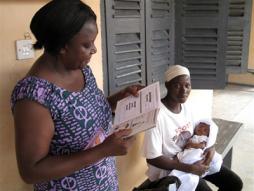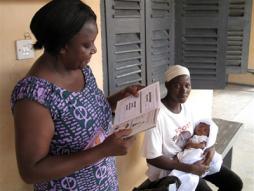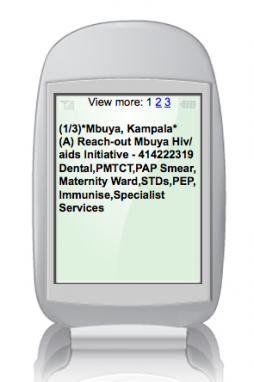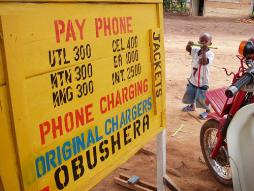grameen foundation
Posted by AnneryanHeatwole on May 03, 2011
The Grameen Foundation
recently released an in-depth report on the
state of MoTeCH, a multi-part project that uses mobile technology to
send pre- and post-natal health information to Ghanaians and allows
community health workers to collect and share health data. Launched in
July 2010 in the Upper East Region of Ghana, the system rolled out
the next phase of the pilot in April 2011 in the Awutu
Senya distract in the Central Region of Ghana. The report, "Mobile
Technology for Community Health in Ghana: What It Is and What
Grameen Foundation Has Learned So Far," takes an honest look at the
progress and challenges the organization has faced while implementing a
long-term, large-scale mHealth project.
Mobile Midwife
| New Research! How MoTeCH Uses Mobiles for Maternal Health in Ghana data sheet 2731 Views |
| Countries: |
Ghana
|
Posted by MelissaUlbricht on Mar 03, 2011
With the increasing number of projects in this mobile-for-change field, there have been a fair share of failures. We have tried to analyze those with project leaders in our series of FailFaires.
But a project does not need to be a failure to an provide an opportunity for public evaluation, reflection, and dialogue, as we see in a recent series of posts. We were excited to see posts that take an introspective approach: these entries assess program effectiveness, identify gaps in M4D projects, and discuss challenges and solutions in the field.
A post on the Grameen Foundation blog discusses a control trial to asses the impact of a mobile for health project in Uganda:
..We recently completed one of the first randomized control trials designed to assess the impact of a mobile phone-driven health service aimed at improving the lives of the poor.
Posted by AnneryanHeatwole on Feb 10, 2010
In an effort to bridge the gap between community health workers and patients, the Grameen Foundation is in the midst of a two and a half-year project called Mobile Technology for Community Health (MoTeCH). MoTeCH, a joint initiative between the Grameen Foundation, Columbia University’s Mailman School of Public Health and the Ghana Health Service, is working to determine how best to use mobile phones to increase the quality and quantity of antenatal and neonatal care in rural Ghana.
The project is two-fold. One service targets what Tim Wood, director of the Grameen Foundation’s Mobile Health Innovation and ICT Innovation divisions calls “pregnant parents,” and another targets community health workers.
| MoTeCH: A Mobile Approach to Maternal Health Care data sheet 9340 Views |
| Countries: |
Ghana
|
Posted by KatrinVerclas on Jul 01, 2009
My post on Google's SMS services raised quite the storm in the waterglass. Erik Hersman took me to taks for, as he sees it, questioning that "if people who are claiming to help the poor should charge, and if so, should they make a profit."
However, this was not my point. My question was why, given the target audience as noted in the Google post and Grameen Foundation press release, for at least one of the services (SMS Tips) the cost per SMS comes at the highest premium price but is not advertised as such in the promotional literature and PR. Secondly, given that Google Labs in India makes a smilar SMS info service available at the regular cost of an SMS in India (which is exceedingly cheap), why does Google behave so differently in the African market, in essence colluding with the absorbitantly high costs of SMS there?
So I emailed Rachel Payne, Google’s lead in Uganda to clarify the costs that I only speculated about. Here is what she says, clarifying the pricing:
Posted by KatrinVerclas on Jun 30, 2009
Google, in partnership with MTN Uganda, has launched 'Google SMS', a set of services that allows users in the country to access SMS information services. These include, for example, access to health and agriculture tips, weather information, and news and sports. Google offers these online information services aready on the web, but is now expanding them to SMS - however, at a high price per SMS.
"We seek to serve a broad base of people -- not only those who can afford to access the Internet from the convenience of their workplace or with a computer at home," said Rachel Payne, Google's country manager for Uganda, in a post on the Google blog.
Posted by CorinneRamey on Dec 06, 2007
Mobile phone businesses are transforming families and villages in Uganda, writes Tatum Anderson of the BBC. The article profiles Joseph Ssesanga, a 24-year-old entrepreneur who started a mobile call center in his family's home.
The business began as part of a loan from a microfinance institution, and has grown into a company that operates in six villages and employs other phone operators. Ssesanga even bikes around the village offering the phone service to his neighbors. He says that the family is much better off financially, and can now afford to pay costs like school fees.
The family business now operates in six villages, employs phone operators and even provides a phone-charging service for those with their own handsets. They were able to repay the loan in four months, and today can afford to pay school fees. "We were farmers, but seasons are a major problem. We grow vegetables, but sometimes they can be damaged and you lose everything," he said to the BBC.



